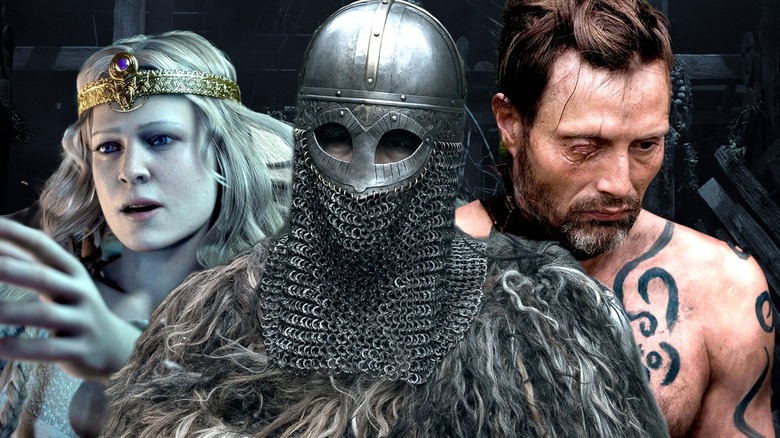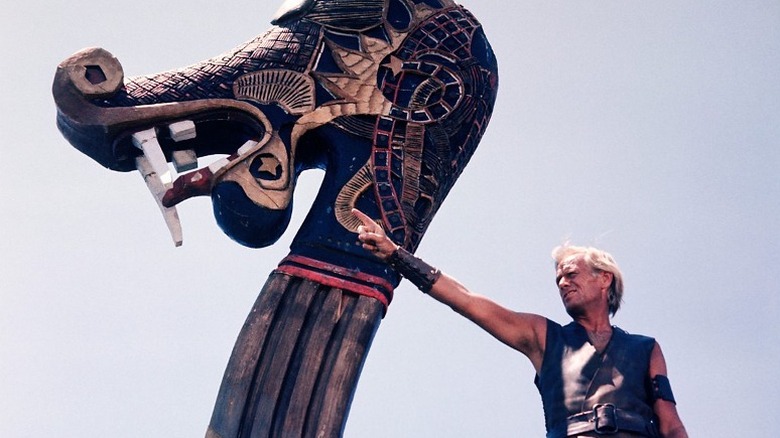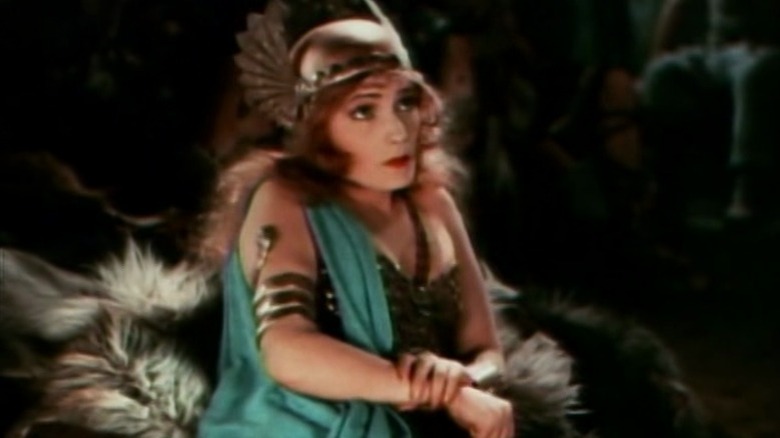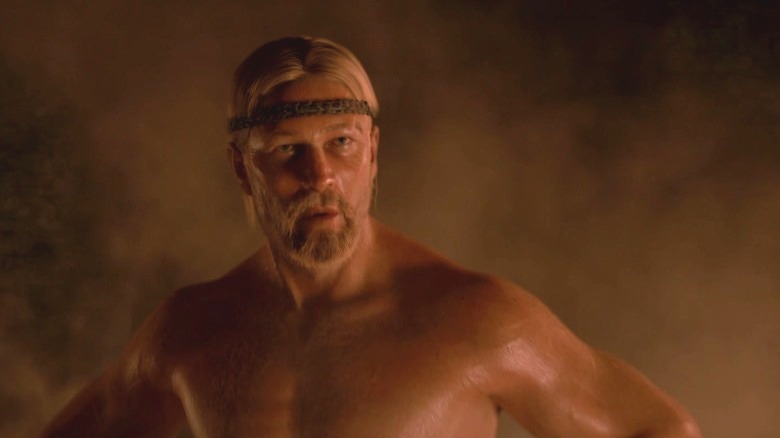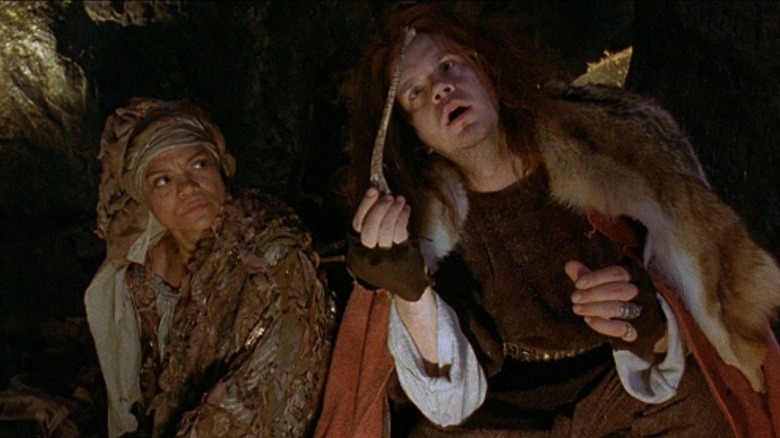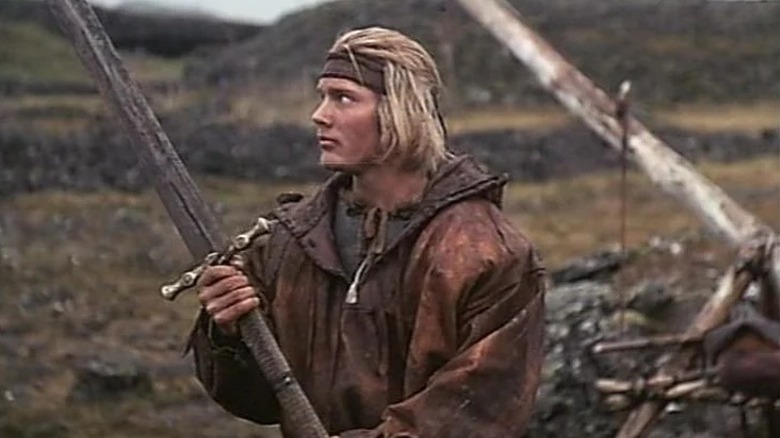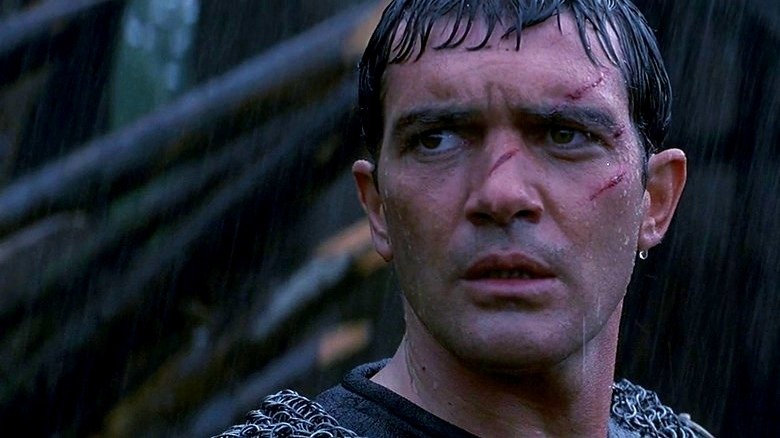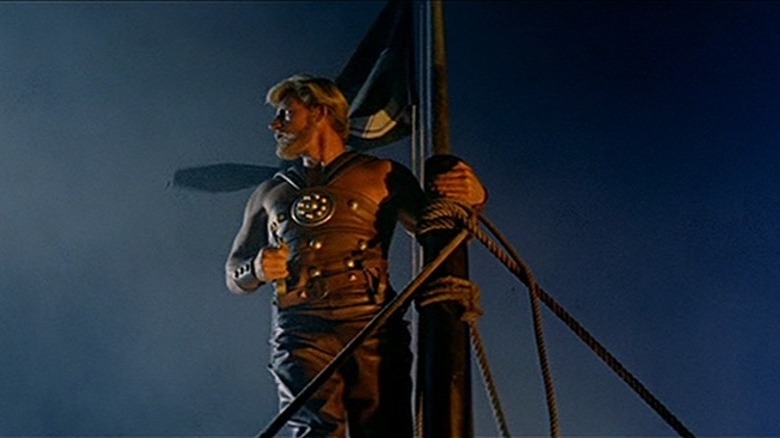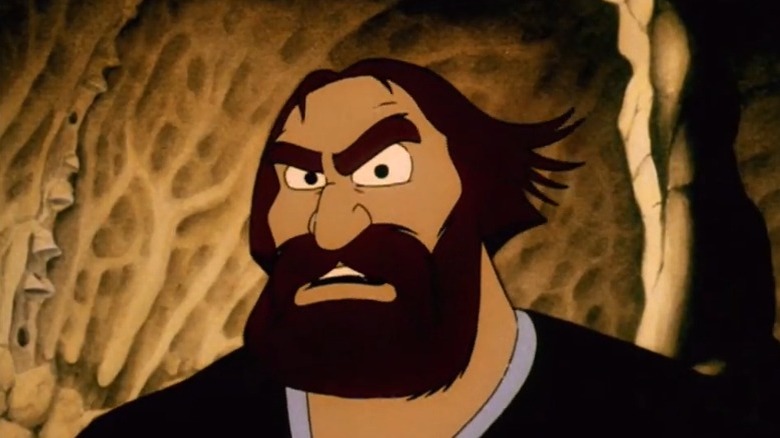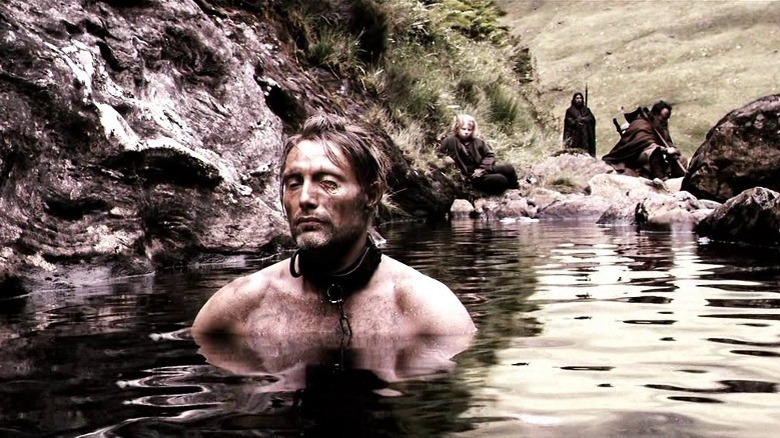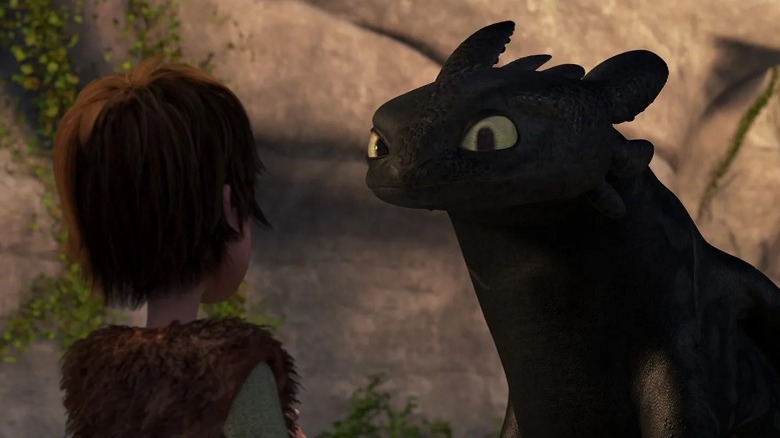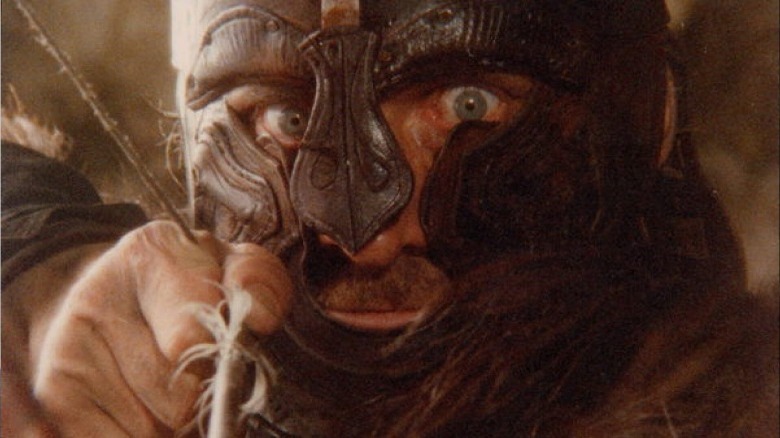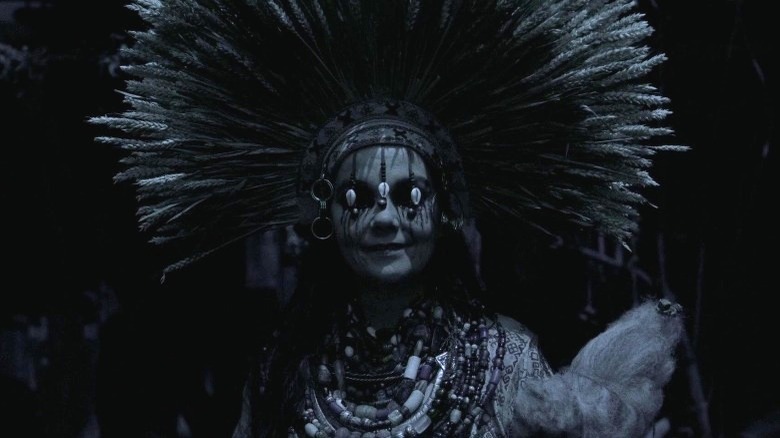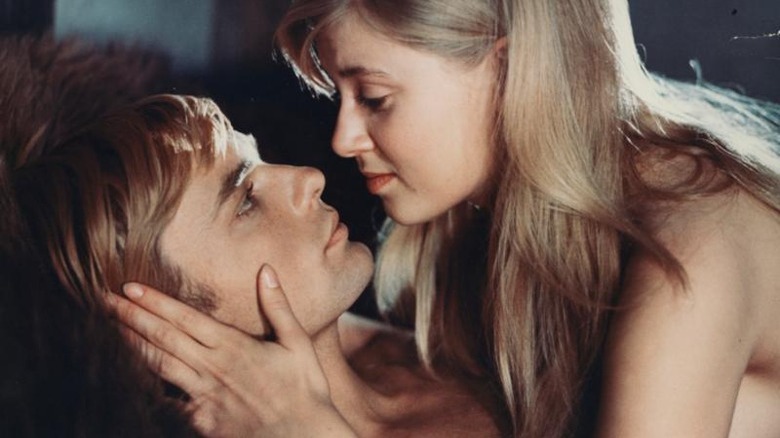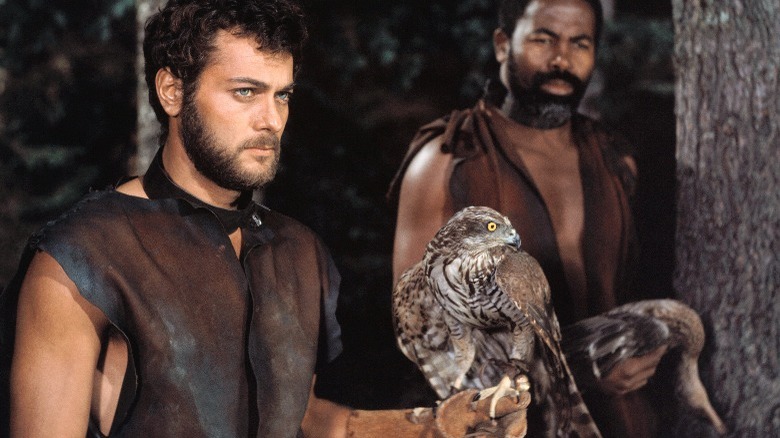The 14 Best Viking Movies Ever Made
Who doesn't love a good Viking movie? Nearly a full millennium after the Vikings' heyday, stories of the Scandinavian seafarers and warriors who rampaged their way through Europe and around the world in the 8th through 11th centuries still fascinate us — enough to inspire an entire subgenre of historical fiction that spans various media. Film in particular has returned to the Viking world repeatedly since the silent era, with productions that hail from Iceland, America, Norway, Britain, Denmark, and more.
A quick scan of the most notorious Viking-themed films reveals that these movies have never been just one thing; it's a milieu that lends itself to comedy, romance, horror, superhero-style action, and, of course, the gruesome war sagas it's most commonly associated with. Here, then, are 14 essential Viking movies that should cover a wide range of cinematic tastes and proclivities, while still satisfying anyone who's just looking for a grand, bloody, swashbuckling ol' time.
14. The Long Ships (1964)
There was a period during Hollywood's transitional mid-century, post-Golden Age period in which its obsession du jour with historical epics and cross-cultural spectacles translated to a brief wave of Viking films. Jack Cardiff's "The Long Ships" is undoubtedly one of the most memorable of that crop.
Based (very loosely) on the eponymous novel by Swedish author Frans G. Bengtsson, the film tells the story of Moorish king Aly Mansuh (Sidney Poitier) and Norse explorer Rolfe (Richard Widmark), who are forced to join efforts and crews to track down the legendary Mother of Voices, a mythical golden bell supposedly hidden somewhere in the vicinity of the Mediterranean. Although somewhat goofy and sophomoric from a technical standpoint, the film is still a consolidated genre classic due to the charm of its lighthearted adventure, its earnest tone, and its visually rich sets and costumes.
13. The Viking (1928)
One of the earliest Viking-themed features, Roy William Neill's "The Viking," is also the most notable (albeit highly fictionalized) cinematic adaptation of the story of Leif Ericsson, the Norse voyager known as the first European to set foot in North America. Starring Donald Crisp, "The Viking" interweaves Leif's world-changing journey with a plot focused on the romantic rivalry between Leif and his captured slave-turned-friend Alwin of Northumbria (LeRoy Mason), both of whom are vying for the affection of Leif's protegé, Helga (Pauline Starke).
That classic epic-adventure setup is conducted in typically satisfying Golden-Age Hollywood fashion. However, the plot is but one, and arguably the least important, of the film's attractions: In addition to its historical importance to Viking cinema, "The Viking" was also the first soundtracked Technicolor film ever released, making it a crucial time capsule of what's arguably cinema's most momentous transitional period.
Interestingly, "The Viking" still essentially qualifies as a silent film, as the synchronized sound amounts entirely to music and sound effects while the dialogue is still delivered in intertitles. The surreal, time-traveling effect that soundscape creates would be reason enough to give the film a watch, but, for Viking enthusiasts, the lush production design and costumes, rendered in unique and gorgeously strange colors by the early two-strip Technicolor process (which only captured shades of green and red), should be even more enticing.
12. Beowulf (2007)
Although not a stricto sensu Viking film, seeing as it's set several centuries prior to the social organization of Norse raiders to which the word refers, Robert Zemeckis' "Beowulf" nonetheless captures the essential spirit of Viking cinema by following the historical precursors of the Vikings and by bringing Scandinavian myth and heroic legend to life.
The film, arguably the most high-profile of the numerous cinematic takes on "Beowulf," follows the epic poem's tale of a Geatish warrior (Ray Winstone) on a mission to slay the fearsome creature Grendel (Crispin Glover) more faithfully than most adaptations — although it still takes its share of dramatic liberties, courtesy of the illustrious screenwriter duo of Neil Gaiman and Roger Avary. Like almost every Zemeckis feature, "Beowulf," the director's immediate follow up to "The Polar Express," also doubles as a bold formal experiment: Fully animated with the most cutting-edge motion capture technology available at the time, the film attempts to visualize what a "serious" action-adventure film might look and move like if rendered entirely in ultra-photorealistic CGI.
That technical gambit proved controversial even at the time; the film received mixed reviews and underperformed at the box office. Nowadays, its once-pristine VFX look a tad dated. Yet Zemeckis' indefatigable eye for spectacle comes through even more clearly in the face of all that temporal distance; stripped of the pressure to look convincing, "Beowulf" is revealed as one of the best-constructed and most imaginative epic fantasy sagas of the 2000s.
11. Erik the Viking (1989)
As a filmmaker, Terry Jones is primarily remembered for the three masterpieces of absurdity he helmed and co-helmed as Monty Python's resident director of big-screen ventures: "Monty Python and the Holy Grail," "Life of Brian," and "The Meaning of Life." Yet Jones' directorial career wasn't limited to his work with the legendary British comedy troupe. Six years after the Pythons ended their official collaborative run (not counting reunions) with "The Meaning of Life," Jones could still be found on the historical comedy beat thanks to "Erik the Viking."
While not quite as supernaturally hilarious and visionary as Jones' previous satires of medieval historical epics — it would be much closer to the top of this ranking if that were the case — "Erik the Viking" still retains all the wit, irreverence, and goofy charm of the director's best work. It also boasts some features that mark it as decidedly non-Pythonesque: namely, a varied international ensemble cast that includes Tim Robbins, Eartha Kitt, and Mickey Rooney, and a fully sincere and straightforward narrative.
The film, an adaptation of a children's book authored by Jones himself, follows Erik (Jones), a young Viking who can't seem to fall in with his people's pillaging and acts of violence. However, he gets a chance to prove himself by leading an expedition to Valhalla in order to ask the gods to end the Age of Ragnarok. Comedy and adventure of the highest order ensue — and without undermining each other, as in certain recent Norse-themed superhero films.
10. The White Viking (1991)
Icelandic director Hrafn Gunnlaugsson is one of the most notorious figures in the history of his country's cinema, and of all the movies on his three-decade-spanning filmography, he is perhaps best remembered for the run of classic Viking features he released between 1984 and 1991. All three films, which are collectively known as his "Raven Trilogy" or "Viking Trilogy," are very much worth watching, including the last one, 1991's "The White Viking" — also sometimes called "Embla," after its principal female character.
Loosely inspired by the real-life historical record, "The White Viking" is set during the reign of Olaf I of Norway, who ruled over the kingdom during its transition from the Old Norse faith to Christianity. King Olaf (Egill Ólafsson), a fanatical Christian, is in the process of consolidating his rule by eradicating paganism and the land ownership of Earls. He finally manages to defeat Earl Godbrandur (Þorsteinn Hannesson) and capture his daughter Embla (Maria Bonnevie), who is held captive in a convent. To save her, Embla's husband, Askur (Gotti Sigurdarson), the son of a powerful Icelandic lawspeaker, is ordered to travel to his home country and christen its people.
The most lavish, assured, and visually accomplished of Gunnlaugsson's Viking films, "The White Viking" exists in multiple versions; if you can, go with the 2007 director's cut, which most closely approximates the director's original vision by putting a greater emphasis on Bonnevie's character.
9. The 13th Warrior (1999)
Here's a film that would've earned an even higher spot on this list if it hadn't been mangled by production circumstances. Directed by John McTiernan and based on Michael Crichton's novel "Eaters of the Dead," which liberally melds "Beowulf" with the history of the Varangian Vikings as recounted by Ahmad ibn Fadlan, "The 13th Warrior" could have been one of the great historical epics of the 1990s. However, the film got stuck in the dreaded post-production hell of endless reshoots and re-edits following poor test screenings; ultimately, Disney replaced McTiernan with Chrichton, who cut much of the "Die Hard" director's work from the final product.
Even so, what remains of McTiernan's film is enough to get the blood pumping. Antonio Banderas stars as the film's fictionalized Ahmad ibn Fadlan, the 10th-century Muslim poet and traveler famous for his detailed accounts of the Viking world. "The 13th Warrior" positions Ibn Fadlan as an audience surrogate in the Varangians' "Beowulf"-like quest to slay a deadly, ancient creature, and while it's inevitably messy, the end result provides almost everything you could want from a sturdy, lushly-made Viking flick.
8. Erik the Conqueror (1961)
Mario Bava is primarily remembered for helping make the gruesome Italian horror cinema of the 1960s and 1970s into a worldwide phenomenon. But Bava's mastery as a filmmaker and writer wasn't limited to horror; among his many other ventures, he also had a kind of a side gig as the director of Viking-themed swashbuckling pictures, the best and most celebrated of which is "Erik the Conqueror."
Directed by Bava from a screenplay by him and fellow Italian cinema luminaries Oreste Biancoli and Piero Pierott and loosely based on Richard Fleischer's "The Vikings," "Erik the Conqueror" is an epic about estranged brothers on opposing sides of a bloody war in the 9th century. Eron (Cameron Mitchell) and Erik (George Ardisson) are born in Scandinavia and separated early in life during strife between the Vikings and the English; Erik is raised as an Englishman, while Eron is brought back home.
Twenty years later, a war erupts between the two peoples, leading the brothers to meet again under the most charged circumstances. If you don't think Bava's incantatory, expressionistic style would suit the particular demands of a historical epic, you'd be wrong: "Erik the Conqueror" brilliantly locates the nugget of Greek tragedy in Erik and Eron's story, and emphasizes it with the same aesthetic and emotional fervor that the director routinely applied to his horror tales.
7. Valhalla (1986)
A must-see for fans of Viking movies and European animation enthusiasts alike, "Valhalla" is also a universal cultural reference for any Dane who grew up in the 1980s. Directed by Disney veteran Jeffrey J. Varab alongside Danish cartoonist and illustrator Peter Madsen, the film adapts three volumes of the popular Danish comic series of the same name, which tells whimsical, humorous stories set in the world of Scandinavian mythology.
"Valhalla" concerns two Midgardian siblings, the peasants Tjalvi and Röskva, who cross paths with Thor and Loki and, through a series of circumstances, find themselves whisked away to Asgard as Thor's new servants. They soon embark on a series of magical adventures. As a family-friendly take on the world of Norse gods like Thor and Loki with beautiful, expressive, and detailed cel animation, the film taps into a primal sense of wonder and discovery that makes it a particularly crucial entry in the Viking cinema canon.
6. Valhalla Rising (2009)
Shortly after Nicolas Winding Refn introduced himself to English-speaking audiences with "Bronson" and right before he became a household name with "Drive," and when Mads Mikkelsen had just introduced himself to English-speaking audiences with "Casino Royale" and was right on the verge of achieving A-list status via "Hannibal," the two superstars of Danish cinema made a film that stands out in both their filmography as roundly well-liked yet strangely underdiscussed: "Valhalla Rising."
As pure and bare-knuckled a Viking film as they come, Refn's genre exercise is set largely in the Scottish Highlands, telling the story of a mute, one-eyed thrall (Mikkelsen) who manages to kill his chieftain (Alexander Morton) and escape captivity with the help of a young boy (Maarten Stevenson). The man and the boy, unnamed like every other character in the film (though the boy eventually nicknames Mikkelsen's character "One-Eye"), end up joining a band of Christian Norse Crusaders on their way to the Holy Land. The journey soon turns dark, mystical, and — typically for Refn — astonishingly violent. It's a film of such elemental force that, were it not for the entirely English-language dialogue, you could almost mistake it for a trek through time straight into the middle of the Viking world.
5. How to Train Your Dragon (2010)
"How to Train Your Dragon" may well be the out-and-out best film on this list. The only reason it's not ranked higher is that, as these things go, it's not quite as representative of the "Viking film" subgenre as the next few entries. Although the tenets of cinematic "Viking culture" figure significantly into the plot, and are lovingly parodied in DreamWorks Animation's typical deconstructionist style, this is really more of a contemporary-style boy-and-his-dog — oops, boy-and-his-dragon — story that happens to be set in the Viking world.
Be that as it may, what a picture. Arguably the best family-oriented fantasy adventure saga Hollywood has released in the 21st century, animated or not, "How to Train Your Dragon" still packs as mighty of a punch as it did back in 2010, even after two sequels, three TV series, and one live-action reboot announcement. The sheer beauty of the evolving friendship and slowly-developing mutual trust between Hiccup (Jay Baruchel) and Toothless, the most endearing 26-foot beast ever conceived by a character design team, is enough to land this film on any half-serious list of great Viking movies.
4. When the Raven Flies (1984)
Like "The White Viking," Hrafn Gunnlaugsson's earlier "When the Raven Flies" is a must-see. True to the endless intertextuality of the period's genre cinema, it could be described as a Viking riff on "Yojimbo" by way of spaghetti westerns, with a plot about an Irish man (Jakob Þór Einarsson) who travels to Iceland to get revenge for the raid that took his parents' life when he was a boy.
Really, the whole Viking Trilogy is worth a watch for fans of the genre, but "When the Raven Flies" stands out as its defining achievement. Raw, angry, sweaty, endlessly resourceful despite a limited budget, and representative of the '80s in the best way — it comes complete with a propulsive Icelandic-folk-meets-synth-machines score by Hans-Erik Philip and Harry Manfredini — it's a film that inspired everything that came after it in the realm of Viking-related storytelling, and is routinely cited as one of the greatest Icelandic films of all time.
3. The Northman (2022)
It's not too soon to call it: With "The Northman," Robert Eggers has succeeded in crafting one of the defining Viking movies. In fact, "The Northman" often feels rather like a purposeful, fully aware summation of a century of Viking film iconography, a stab at epitomizing the genre that's as dogged and intrepid in its feverish ambition as the very warriors it tells of.
Starting with the hand-picked cast of superstars including Alexander Skarsgård, Nicole Kidman, Anya Taylor-Joy, Willem Dafoe, and — yes — Björk, everything about the film feels grand, imposing, and statement-like in a way that very few Hollywood blockbusters allow themselves to anymore. With its "Hamlet"-like tale of a warrior prince (Skarsgård) on a quest to avenge his father's murder, the film is both dramatically hefty and formally overwhelming — the biggest, most immersive, and most darkly exuberant work yet from one of the leading American filmmakers of his generation.
2. Hagbard and Signe (1967)
To a significantly greater degree than many of the other Viking films on this list, the criminally little-known "Hagbard and Signe" (also sometimes called "The Red Mantle") is soulful, meditative, poetic, and taken with themes of romance and eroticism — which makes sense, seeing as it's directed by the same Gabriel Axel of the culinary drama classic "Babette's Feast."
Although violence still exists at the center of the narrative — which centers on a flimsy truce between two warring clans, ultimately broken due to jealousy and deceit — the primary focus of "Hagbard and Signe" is the bond between the two titular star-crossed lovers (played by Oleg Vidov and Gitte Hænning), who endeavor to be together even as war threatens to pull them apart.
It's a different speed and a different look for a Viking story, but that's what makes the film's exploration of its milieu so enchanting. Its evocation of doomed, obstinate love against a backdrop of tragedy and chaos gives it an almost Gothic sweep, yet remains unmistakably planted in the Norse folkloric tradition.
1. The Vikings (1958)
When it comes to strengthening the contemporary notion of Vikings in the public imagination and establishing a standard lexicon of their audiovisual depictions, it's impossible to overstate the importance and influence of "The Vikings." Outside of Europe, it wouldn't be an exaggeration to say that Richard Fleischer's film effectively introduced Vikings as a tangible idea to millions of viewers the world over, and that alone might well make it worthy of the top spot on this list. However, in addition to its cultural impact, "The Vikings" also happens to be a fantastic, endlessly exciting old-school adventure flick.
With a star-studded cast that includes Kirk Douglas, Janet Leigh, Tony Curtis, and Ernest Borgnine, "The Vikings" tells the story of King Ragnar Lodbrok (Borgnine) and his warring sons, which would later become the basis for the popular (and very different) History Channel series "Vikings." Largely shot on location in Norway and graced with the kind of Homeric production scale that made Hollywood epics of the '50s feel almost like brushes with the divine, this is a capital-S Spectacle that matches its sense of grandeur to an equally keen eye for pure, high-spirited fun.
